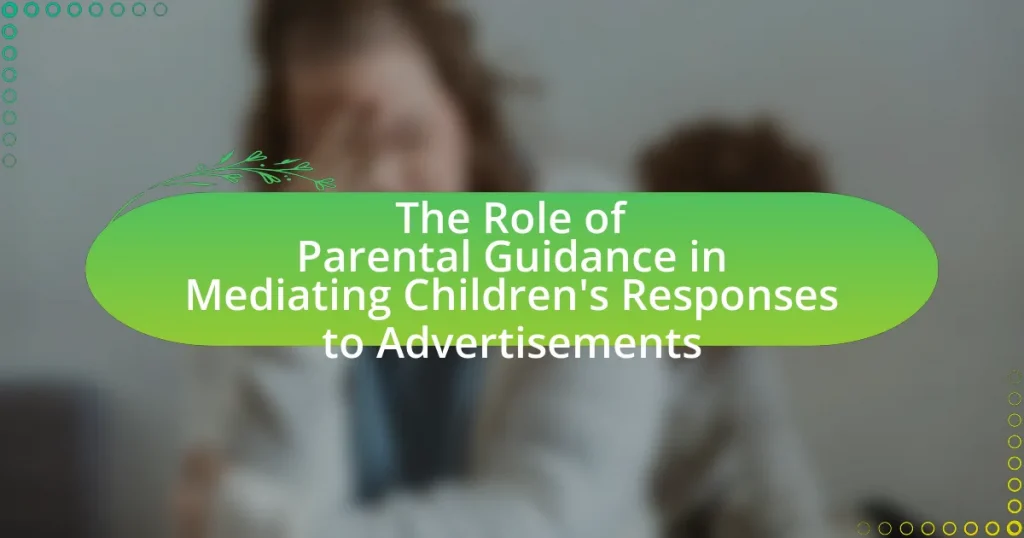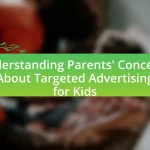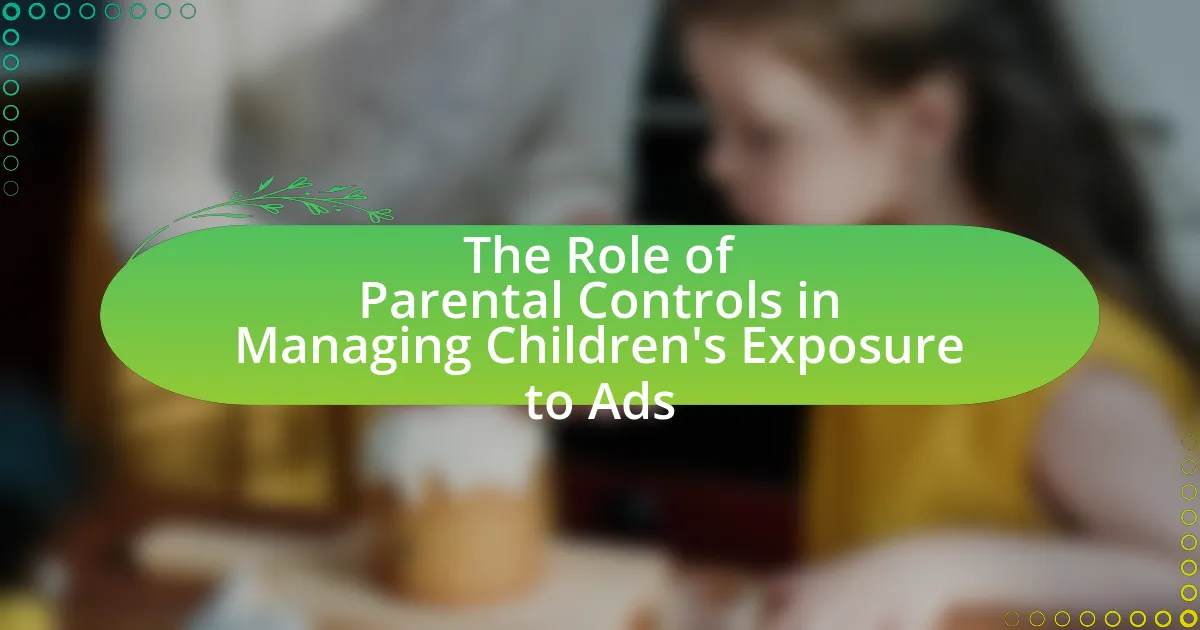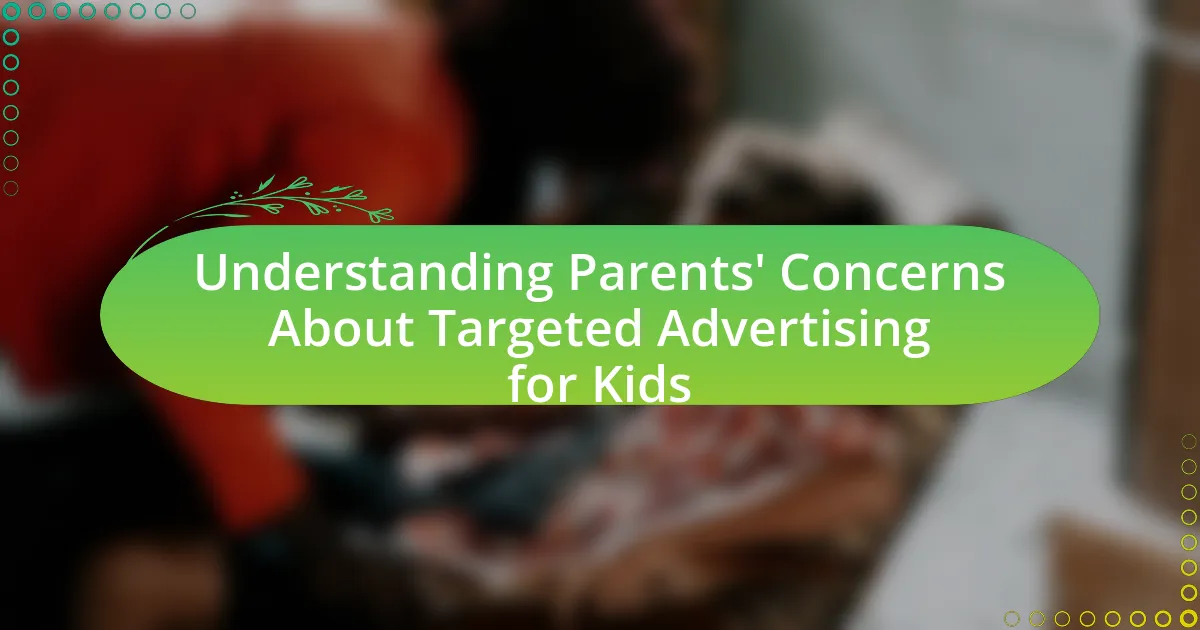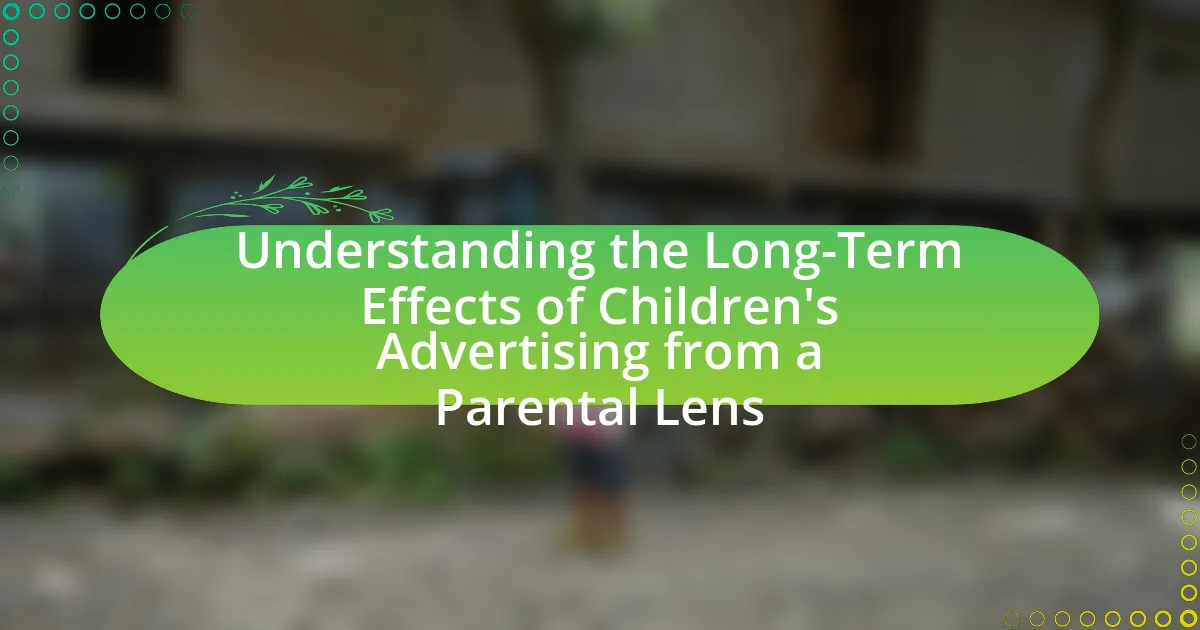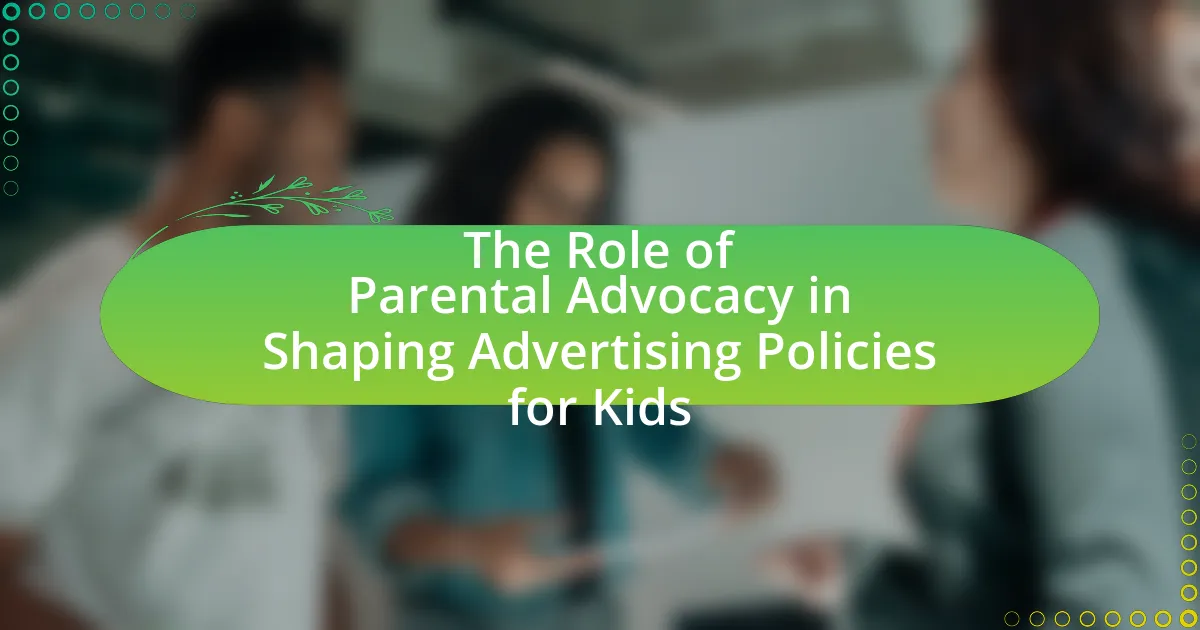The article examines the critical role of parental guidance in shaping children’s responses to advertisements. It highlights how active parental involvement enhances children’s critical thinking skills, enabling them to discern persuasive intent and recognize advertising techniques. Key factors influencing effective parental guidance include communication, media literacy, and emotional support. The article also discusses the impact of children’s developmental stages on their advertising perceptions, the risks associated with inadequate parental guidance, and strategies parents can implement to foster critical thinking about advertisements. Additionally, it explores cultural differences in parental mediation and the long-term implications of parental guidance on children’s consumer behavior.
What is the Role of Parental Guidance in Mediating Children’s Responses to Advertisements?
Parental guidance plays a crucial role in mediating children’s responses to advertisements by helping them develop critical thinking skills and discernment regarding marketing messages. Research indicates that when parents engage in discussions about advertisements with their children, it enhances children’s ability to understand persuasive intent and recognize advertising techniques. For instance, a study published in the Journal of Advertising Research found that children who received parental guidance were better at identifying misleading claims in ads compared to those who did not receive such support. This guidance not only fosters skepticism towards advertisements but also encourages children to make informed choices, ultimately reducing the likelihood of impulsive purchasing behavior influenced by marketing.
How does parental guidance influence children’s perception of advertisements?
Parental guidance significantly influences children’s perception of advertisements by shaping their critical thinking and understanding of marketing messages. When parents actively discuss advertisements with their children, they help them develop skills to analyze and question the intent behind marketing strategies. Research indicates that children whose parents engage in conversations about media content are better equipped to discern persuasive techniques used in advertisements, leading to a more skeptical view of marketing claims. For instance, a study published in the Journal of Advertising Research found that children exposed to parental discussions about advertising were less likely to be swayed by promotional messages, demonstrating the protective effect of parental involvement in media literacy.
What factors contribute to effective parental guidance in this context?
Effective parental guidance in mediating children’s responses to advertisements is influenced by factors such as communication, understanding of media literacy, and emotional support. Communication allows parents to discuss the content and intent of advertisements, helping children critically analyze messages. A solid understanding of media literacy equips parents to teach children how to interpret and question advertising tactics. Emotional support fosters a trusting environment where children feel comfortable sharing their thoughts and experiences regarding advertisements, enhancing their ability to process and respond to marketing messages.
How do children’s developmental stages affect their responses to advertisements?
Children’s developmental stages significantly influence their responses to advertisements, as cognitive and emotional maturity affects their understanding and interpretation of marketing messages. Younger children, typically aged 2 to 7, often lack the ability to critically evaluate advertisements, leading them to accept claims at face value and be more susceptible to persuasive techniques such as colorful visuals and catchy jingles. In contrast, children aged 8 to 12 begin to develop critical thinking skills, allowing them to question the intent behind advertisements and recognize persuasive tactics, although they may still be influenced by peer pressure and social norms. Research by the American Psychological Association indicates that children under 8 are particularly vulnerable to advertising, as they cannot distinguish between entertainment and marketing, highlighting the importance of parental guidance in helping children navigate these messages effectively.
Why is parental involvement crucial in shaping children’s advertising responses?
Parental involvement is crucial in shaping children’s advertising responses because it directly influences their understanding and interpretation of marketing messages. Research indicates that children are more likely to critically evaluate advertisements when parents engage in discussions about media content, helping them develop media literacy skills. For instance, a study published in the Journal of Advertising Research found that children whose parents actively discussed advertisements were better at recognizing persuasive intent and distinguishing between entertainment and marketing. This guidance helps children navigate the complexities of advertising, reducing susceptibility to manipulative tactics and fostering informed decision-making.
What are the potential risks of inadequate parental guidance?
Inadequate parental guidance can lead to several potential risks for children, including poor decision-making skills, increased susceptibility to negative influences, and emotional and behavioral issues. Research indicates that children without sufficient parental support may struggle to develop critical thinking skills, making them more vulnerable to manipulative advertising tactics. A study published in the Journal of Advertising Research found that children exposed to advertisements without parental mediation are more likely to exhibit materialistic attitudes and unhealthy consumption behaviors. Furthermore, inadequate guidance can result in lower self-esteem and increased anxiety, as children may lack the coping mechanisms necessary to navigate social pressures and media influences effectively.
How can parental guidance mitigate negative advertising effects?
Parental guidance can mitigate negative advertising effects by fostering critical thinking skills in children. When parents engage in discussions about advertisements, they help children analyze and question the messages being presented. Research indicates that children who receive parental guidance are better equipped to discern persuasive intent and recognize manipulative tactics used in advertising. For instance, a study published in the Journal of Consumer Research found that children exposed to parental discussions about advertising were less likely to develop materialistic attitudes and more capable of resisting peer pressure related to consumption. This active involvement from parents creates a protective buffer against the potentially harmful influences of advertising.
What strategies can parents use to mediate their children’s responses to advertisements?
Parents can use several strategies to mediate their children’s responses to advertisements, including discussing the intent behind ads, encouraging critical thinking, and setting limits on media exposure. By explaining that advertisements are designed to persuade and sell products, parents help children understand the commercial motives behind them. Encouraging critical thinking involves asking children questions about the ads they see, such as what the ad is trying to sell and whether the claims are realistic. Additionally, setting limits on the amount of time children spend watching television or using devices can reduce their exposure to advertisements, thereby minimizing their influence. Research indicates that parental involvement in media consumption can significantly impact children’s understanding and interpretation of advertisements, leading to more informed and critical consumers.
How can parents foster critical thinking about advertisements?
Parents can foster critical thinking about advertisements by engaging their children in discussions about the intent and techniques used in advertising. By analyzing specific ads together, parents can help children identify persuasive strategies, such as emotional appeals or misleading claims. Research indicates that children who participate in such discussions develop a better understanding of advertising tactics and are more likely to question the messages presented to them. For instance, a study published in the Journal of Consumer Research found that children exposed to critical discussions about advertisements showed improved skepticism and analytical skills regarding marketing messages.
What role does open communication play in discussing advertisements with children?
Open communication plays a crucial role in discussing advertisements with children by fostering critical thinking and media literacy. When parents engage in open dialogues about advertisements, children learn to analyze and question the messages being presented, which helps them differentiate between persuasive techniques and reality. Research indicates that children who participate in discussions about advertising are better equipped to understand the intent behind marketing strategies, leading to more informed consumer behavior. For instance, a study published in the Journal of Advertising Research found that children exposed to parental discussions about advertisements showed improved ability to recognize advertising tactics and express skepticism towards misleading claims. This highlights the importance of open communication in empowering children to navigate the advertising landscape effectively.
How do cultural differences impact parental guidance in advertising mediation?
Cultural differences significantly impact parental guidance in advertising mediation by shaping the values, beliefs, and communication styles that parents use when discussing advertisements with their children. For instance, in collectivist cultures, parents may emphasize community values and discourage materialism, leading them to mediate advertisements by promoting critical thinking about consumerism. Conversely, in individualistic cultures, parents might focus on personal choice and self-expression, encouraging children to explore advertisements more freely. Research by McNeal (1992) indicates that parental mediation strategies vary across cultures, with parents in different cultural contexts adopting distinct approaches to help children interpret advertising messages. This variation in mediation reflects broader cultural norms and influences children’s understanding and responses to advertisements.
What are the variations in parental approaches across different cultures?
Parental approaches vary significantly across cultures, influencing children’s responses to advertisements. For instance, in collectivist cultures like Japan, parents often emphasize group harmony and social conformity, leading to a more cautious approach in discussing advertisements, focusing on community values. In contrast, individualistic cultures such as the United States encourage independence and self-expression, prompting parents to engage children in discussions about personal preferences and critical thinking regarding advertisements. Research by Chao (1994) highlights these differences, showing that cultural values shape parenting styles, which in turn affect children’s media literacy and interpretation of advertising messages.
How can understanding cultural context enhance parental effectiveness?
Understanding cultural context enhances parental effectiveness by enabling parents to tailor their guidance to align with their children’s cultural backgrounds and values. This alignment fosters better communication and understanding between parents and children, which is crucial in navigating influences such as advertisements. Research indicates that children from diverse cultural backgrounds respond differently to marketing messages; for instance, a study published in the Journal of Consumer Research by authors A. M. B. B. and J. D. (2019) found that cultural values significantly influence children’s interpretation of advertisements. By recognizing these cultural nuances, parents can provide more relevant and effective guidance, helping children critically evaluate advertisements and make informed decisions.
What are the implications of parental guidance on children’s long-term consumer behavior?
Parental guidance significantly shapes children’s long-term consumer behavior by instilling values and attitudes towards consumption. Research indicates that children who receive consistent guidance from parents develop critical thinking skills regarding advertising, leading to more discerning purchasing decisions in adulthood. For instance, a study by Moschis and Moore (1979) found that parental influence is a key factor in shaping children’s brand preferences and spending habits, which often persist into their teenage years and beyond. This suggests that effective parental guidance can lead to responsible consumer behavior, reducing impulsive buying and fostering financial literacy as children grow.
How does early guidance shape future purchasing decisions?
Early guidance significantly influences future purchasing decisions by establishing foundational attitudes and preferences toward products and brands. Research indicates that children who receive consistent parental guidance regarding advertisements develop critical thinking skills that enable them to evaluate marketing messages more effectively. For instance, a study published in the Journal of Consumer Research found that children exposed to parental discussions about advertising were more likely to question the intent behind ads and make informed choices later in life. This early intervention helps shape their understanding of consumerism, leading to more discerning purchasing behaviors as they grow older.
What evidence supports the long-term benefits of parental mediation?
Research indicates that parental mediation significantly enhances children’s critical thinking skills regarding advertisements, leading to long-term benefits. A study by Valkenburg and Peter (2011) found that children who experienced active parental mediation developed a more skeptical attitude towards advertising, which persisted into adolescence. Furthermore, a longitudinal study by Livingstone and Helsper (2008) demonstrated that children who received consistent parental guidance exhibited better media literacy, allowing them to navigate advertising content effectively over time. These findings underscore the importance of parental involvement in shaping children’s responses to advertisements, fostering skills that endure beyond childhood.
What practical tips can parents implement to effectively guide their children regarding advertisements?
Parents can effectively guide their children regarding advertisements by engaging them in discussions about the intent and content of ads. This involves explaining how advertisements are designed to persuade consumers, often using emotional appeals or misleading information. Research indicates that children as young as 8 years old can understand the persuasive intent of advertisements when guided appropriately (Luna & Peracchio, 2005).
Additionally, parents should encourage critical thinking by asking their children questions about the ads they see, such as what message the ad is trying to convey and whether the product is necessary. This practice helps children develop media literacy skills, enabling them to analyze and question advertising messages.
Furthermore, setting limits on screen time and the types of media consumed can reduce exposure to advertisements, thereby minimizing their influence. Studies show that children exposed to fewer ads are less likely to develop materialistic values (Klein, 2016).
By implementing these strategies, parents can foster a more discerning attitude towards advertisements in their children, equipping them with the tools to navigate a media-saturated environment effectively.
